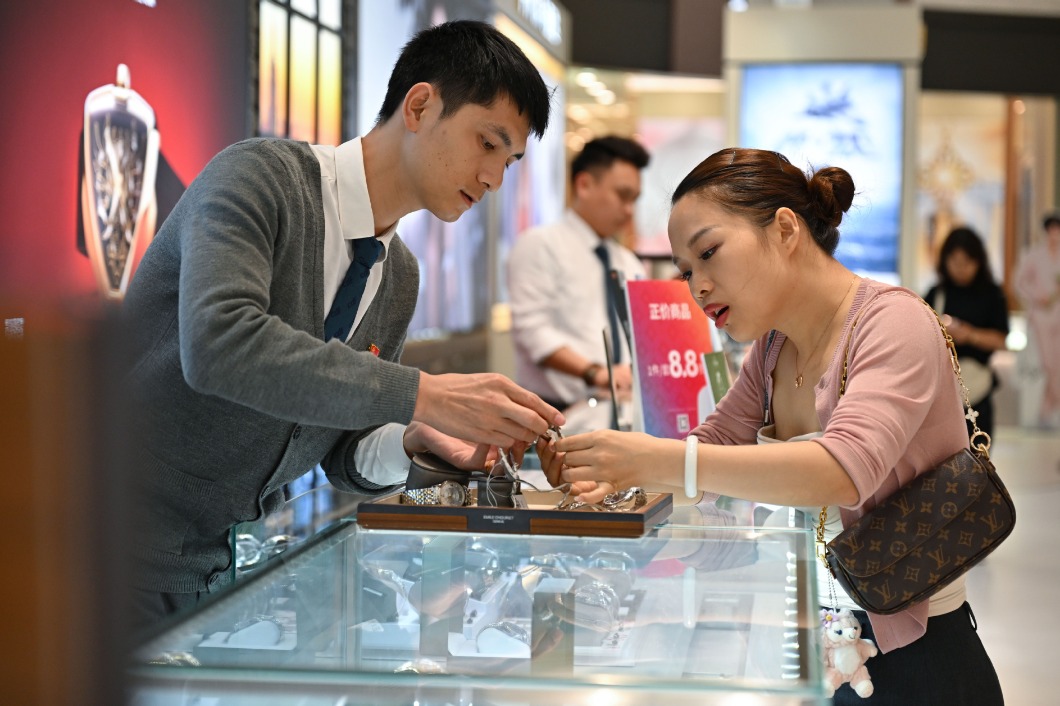Company uses technology to create beautiful story


Du Han, a startup entrepreneur and mother of two, said she knows not only what women want, but also what they don't want.
Du is the founder of Comper, one of the fast-rising domestic producers of facial beauty devices and home-use healthcare digital devices. She also has a background in venture capital investing.
The company, which focuses on technology-oriented innovations, has developed products including skincare devices, thermometers, fertility trackers, fetal monitors and a smart weight scale. Comper was listed by Beijing's municipal government this year as one of the small and medium-sized enterprises that specialize in niche sectors, command a high market share, and have strong innovative capacity.
The company said their upscale devices use technologies such as micro-vibration massage, radio-frequency heating, infrared and near-infrared light therapy and electrical muscle stimulation. It said the technologies are used for purposes such as collagen regeneration, wrinkle reduction, tightening and lifting, cell and capillary repairing. They can also stimulate muscles, improve circulation, and reduce acne and pigment issues.
Du said that as they designed their facial beauty devices, she and her research team discovered one leading factor that often makes such devices less effective than they should be-difficulty of use and low use frequency.
Comper came up with several solutions, and the first was to enable their devices to provide additional results each time consumers use them. Du said the first breakthrough came when they increased the power of their devices to 24 watts, far surpassing the industry average of about 10 watts. The company's website says that they can provide a "beauty-salon effect" at home.
Du said the "higher power, better effect" presented its own challenge-how to ensure user safety while using such a powerful tool.
She said Comper's research team added such safeguards as thermal sensors both inside and on the outside of their devices to ensure the safety of delicate skin. They also made their devices waterproof to encourage sanitary use.
To encourage consumers to use their products more often, the company developed a mobile application that connects with their devices to help teach users how the machines work.
"Most of the time, the beneficial effects of beauty devices come from their consistent use. The application and its programs are able to tell users about the condition of their skin and how to use the machines in the simplest way," she said.
"It's like doing yoga and pushups at the same time for a continuous 22 days. The effect would be instantly visible. Helping users see immediate effects is what encourages them to keep using our devices," Du said.
The company saw its sales in the first two months of the year grow by 10 times, compared with the same period last year. This year, the company is aiming to raise annual revenue to four times that of last year.
In 2017, Du said she and her medical product team, which started by producing maternity devices, found the company's sector far from saturated. She said the market was valued at about 7 billion yuan ($1.05 billion) and included only three major overseas brands.
The sector is estimated to have been worth a total of 11.18 billion yuan in 2021, according to a Market-IDX report, despite a decline of 4 percent year-on-year compared with 2020.
The report, based primarily on internet sales via the Tmall platform, shows that the Chinese market value for beauty devices for facial use is still growing, though the quantity of sales has shown a decrease, mostly caused by a decline in sales of lower-priced products.
According to a study conducted by Kantar Worldpanel China last September, Chinese women aged between 15 and 39 have relatively higher preferences for hair salons and beauty devices, compared with lower interest in beauty salons and medical aesthetic procedures. Its research in December found an increasing number of Chinese females have used beauty devices.
"Home beauty devices have become one of the options for Chinese consumers in terms of effective skin treatment, triggering consumer demand and rapid industry development," said Jason Yu, general manager of Kantar Worldpanel China.
"However, achieving sustainable and healthy development with professional and regulated approaches is key for the future of the sector," Yu added.
Du, who founded Regent Capital Group, said she noticed the sector's potential and spent two years investing in research and development. Research has been carried out on medical equipment as well as consumer product sectors. Combining findings from the two has enabled the company to develop a more sophisticated outlook and apply it to benefit consumers, Du said.
Du said the company has benefitted from being one of the few that have obtained licenses in both medical and beauty devices, given that the government recently released a new regulation that all thermal beauty devices need medical licenses.
Comper has invested 50 million yuan in its own factory in Yizhuang in Beijing's Daxing district, which has won multiple approvals such as the United States Food and Drug Administration, the company said.
"Our factory is closer to the Chinese market, making it able to respond quickly to product updates and consumer demand," Du said.
According to CBNData, 91.3 percent of those aged between 22 and 32 years old who were interviewed for a survey in 2020 chose aesthetic medicine as the primary way to fight against aging, followed by skincare and workout. There are 100,000 companies in the field of beauty devices, with eight out of 10 of them having registered in the past five years.
However, the now-crowded market often leaves consumers confused, Du said. Comper said with its products, priced at around 2,500 yuan on average in China, it is hoping to win more domestic customers by offering a product similar in quality to foreign rivals. On their English-language website, the Smarkin 4-in-one Beauty Device is priced at $429, marked down from $499, with shipping available around the world.
Experts say that the penetration of beauty devices in China is still lower than that in European and US markets.
In China, the penetration rate is about 0.5 percent, while the ratio is 11 percent in Japan and South Korea, and 20 percent in the US and European markets, studies have shown.
In an attempt to reach more potential customers, companies are relying on marketing via short-video social platforms and other social media as well as mainstream advertising services.
Many consumer brands, however, have found that their efforts to boost sales through livestreaming and key online influencers this year have been hampered by higher costs. Comper officials say they have prioritized mainstream advertising to boost their reputation and build brand awareness among the public.
The company has started to work with Focus Media, which has strengths in advertising in elevators in office and residential buildings, officials said.
"It takes time to expand from a niche and focused consumer group to mainstream consumers. It's like a river flowing from a small lake to the ocean," Du said. "We are prepared for revenue fluctuations during the process in order to reach our long-term objectives."




































